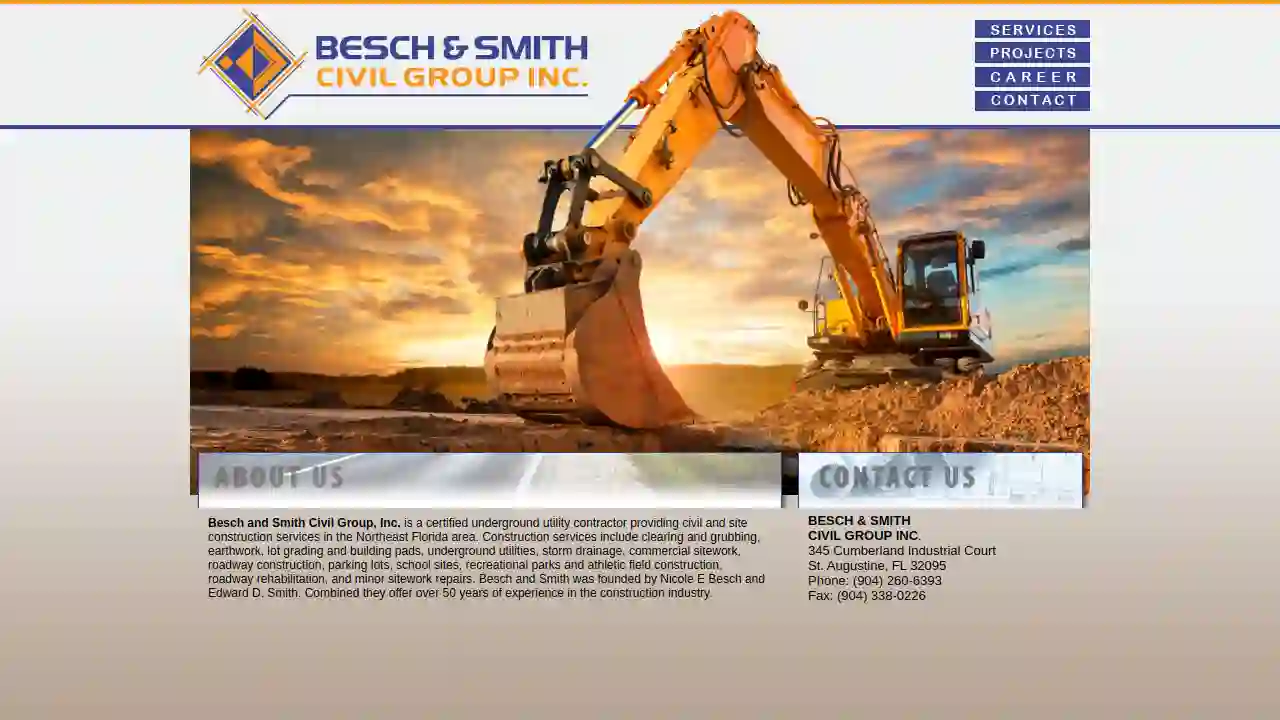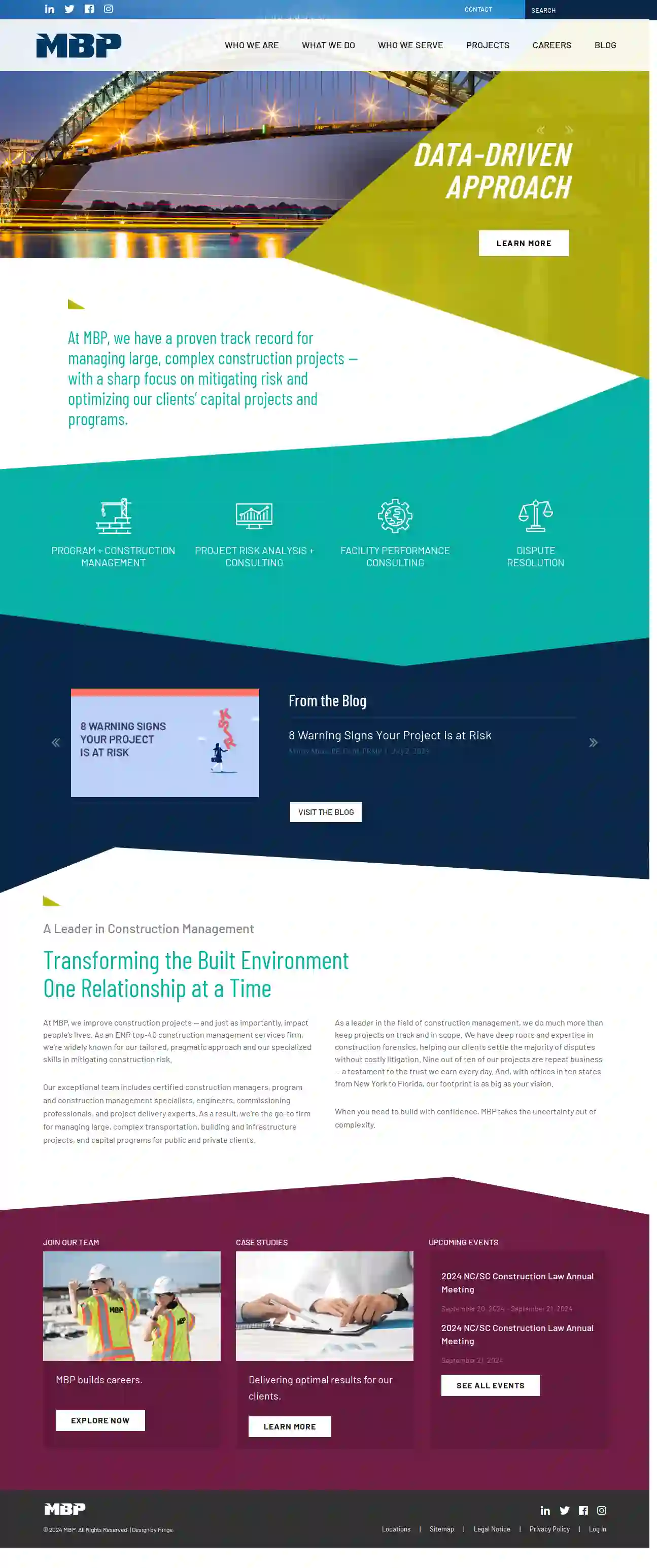Excavation Contractors Wilmington
Find top Trenching Services in Wilmington
Get multiple Trenching Services quotes for your project today! Compare profiles, reviews, accreditations, portfolio, etc... and choose the best service.
- Co
Complete Upstate Contractors LLC
4.914 reviewsAsheville, US- Services
- Why Us?
Get Quote 
Besch & Smith Civil Group Inc
3.79 reviews345 Cumberland Industrial Court, St. Augustine, 32095, USBesch and Smith Civil Group, Inc. Besch and Smith Civil Group, Inc. is a certified underground utility contractor providing civil and site construction services in the Northeast Florida area. We specialize in a wide range of construction services, including clearing and grubbing, earthwork, lot grading and building pads, underground utilities, storm drainage, commercial sitework, roadway construction, parking lots, school sites, recreational parks and athletic field construction, roadway rehabilitation, and minor sitework repairs. Besch and Smith was founded by Nicole E Besch and Edward D. Smith. Together, they bring over 50 years of experience in the construction industry. We are committed to providing our clients with the highest quality construction services, delivered on time and within budget. We are proud of our reputation for excellence and our commitment to customer satisfaction. We are a team of experienced professionals who are dedicated to providing our clients with the best possible service. We are committed to safety and environmental responsibility. We are also committed to giving back to our community. We are proud to be a part of the Northeast Florida community and we are committed to making a positive impact on the area.
- Services
- Why Us?
- Our Team
- Gallery
Get Quote- Al
All Clear Excavation
51 reviewsRaleigh, US- Services
- Why Us?
Get Quote 
MBP
51 reviewsRaleigh, USThe Most Trusted Voice on Your Project Learn More Better Project Outcomes Learn More We Take the Uncertainty Out of Complexity Learn More Data-Driven Approach Learn More At MBP, we have a proven track record for managing large, complex construction projects — with a sharp focus on mitigating risk and optimizing our clients’ capital projects and programs. As a leader in the field of construction management, we do much more than keep projects on track and in scope. We have deep roots and expertise in construction forensics, helping our clients settle the majority of disputes without costly litigation. Nine out of ten of our projects are repeat business — a testament to the trust we earn every day. And, with offices in ten states from New York to Florida, our footprint is as big as your vision. When you need to build with confidence, MBP takes the uncertainty out of complexity.
- Services
- Why Us?
- Gallery
Get Quote- St
Stratcon Contracting Corp.
13 reviewsRaleigh, US- Services
- Why Us?
Get Quote - MC
MCW Grading & Excavating
1Raleigh, US- Services
- Why Us?
Get Quote - El
Elite Grading and Excavation
53 reviewsAsheville, US- Services
- Why Us?
Get Quote - Gu
Guins Excavating Service
1Raleigh, US- Services
- Why Us?
Get Quote - Co
Competitive Excavation Inc.
3.34 reviewsApex, US- Services
- Why Us?
Get Quote - Fo
Foltz Land Management
56 reviewsAsheville, US- Services
- Why Us?
Get Quote
Over 21,512+ Excavation Businesses on our platform
Our excavation contractors operate in Wilmington and beyond!
ExcavationHQ has curated and vetted the Best Excavation Pros near Wilmington. Find the most reliable contractor today.
Frequently Asked Questions About Excavation Contractors
- Spring and Fall: Often considered favorable due to moderate temperatures and drier soil conditions.
- Summer: Can be suitable, but hot weather can make working conditions challenging and might require additional measures (shade, hydration) for workers.
- Winter: Excavation in winter can be more difficult due to frozen ground, snow, and potential delays caused by inclement weather. It might also require specialized equipment or techniques.
- Soil Type and Stability: Stable, cohesive soils allow for deeper excavations than loose or unstable soils.
- Groundwater Level: Excavations below the water table require dewatering techniques to manage water intrusion.
- Equipment and Resources: The size and capabilities of excavation equipment influence the achievable depth.
- Safety Regulations: OSHA and other safety regulations impose limitations on trench depths without proper shoring or sloping.
- Project Requirements: The purpose of the excavation (basement, pool, foundation) determines the necessary depth.
- Trench Collapses: Unstable trench walls can cave in, posing a severe risk to workers. Proper shoring and sloping are crucial safety measures.
- Utility Damage: Striking underground utilities (gas, water, electric) can cause leaks, explosions, or electrocution. Accurate utility locates and careful digging are essential.
- Falling Objects: Materials or equipment falling into excavations can injure workers. Securing work areas and using appropriate safety gear is vital.
- Equipment Accidents: Operating heavy machinery involves risks of rollovers, collisions, or mechanical failures. Trained operators and proper equipment maintenance are critical.
- Environmental Hazards: Excavated soil might contain hazardous materials (asbestos, lead). Proper testing and disposal procedures are necessary.
- Hauling to Designated Disposal Sites: Transporting excavated material to approved landfills or recycling centers.
- Recycling or Reuse: If suitable, some excavated soil might be recycled for other projects or reused on-site for landscaping or backfilling.
- Complying with Regulations: Adhering to local and environmental regulations for soil disposal to prevent contamination or illegal dumping.
What is the best time of year for excavation?
How deep can you excavate?
What are the risks associated with excavation?
How do you handle soil disposal after excavation?
What is the best time of year for excavation?
- Spring and Fall: Often considered favorable due to moderate temperatures and drier soil conditions.
- Summer: Can be suitable, but hot weather can make working conditions challenging and might require additional measures (shade, hydration) for workers.
- Winter: Excavation in winter can be more difficult due to frozen ground, snow, and potential delays caused by inclement weather. It might also require specialized equipment or techniques.
How deep can you excavate?
- Soil Type and Stability: Stable, cohesive soils allow for deeper excavations than loose or unstable soils.
- Groundwater Level: Excavations below the water table require dewatering techniques to manage water intrusion.
- Equipment and Resources: The size and capabilities of excavation equipment influence the achievable depth.
- Safety Regulations: OSHA and other safety regulations impose limitations on trench depths without proper shoring or sloping.
- Project Requirements: The purpose of the excavation (basement, pool, foundation) determines the necessary depth.
What are the risks associated with excavation?
- Trench Collapses: Unstable trench walls can cave in, posing a severe risk to workers. Proper shoring and sloping are crucial safety measures.
- Utility Damage: Striking underground utilities (gas, water, electric) can cause leaks, explosions, or electrocution. Accurate utility locates and careful digging are essential.
- Falling Objects: Materials or equipment falling into excavations can injure workers. Securing work areas and using appropriate safety gear is vital.
- Equipment Accidents: Operating heavy machinery involves risks of rollovers, collisions, or mechanical failures. Trained operators and proper equipment maintenance are critical.
- Environmental Hazards: Excavated soil might contain hazardous materials (asbestos, lead). Proper testing and disposal procedures are necessary.
How do you handle soil disposal after excavation?
- Hauling to Designated Disposal Sites: Transporting excavated material to approved landfills or recycling centers.
- Recycling or Reuse: If suitable, some excavated soil might be recycled for other projects or reused on-site for landscaping or backfilling.
- Complying with Regulations: Adhering to local and environmental regulations for soil disposal to prevent contamination or illegal dumping.